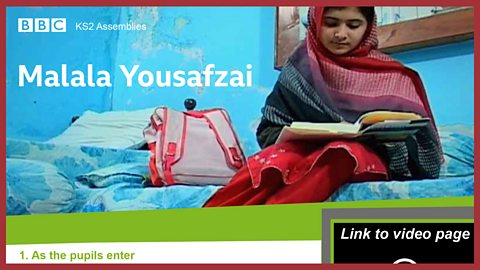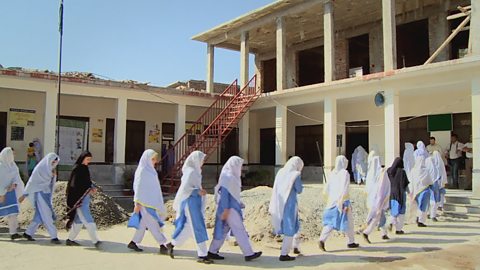In short...
Themes: Equality; education; courage; resilience; inspirational individuals.
Summary: In some parts of the world, children don't have access to good quality education. This assembly focuses on Malala Yousafzai - an education activist and the youngest Nobel Peace Prize laureate. Malala's birthday is 12 July - now celebrated as 'Malala Day'.
Resources: the framework to download / print (pdf); an image of children walking in to their school in north-west Pakistan.

The video
The video tells the story of Malala Yousafzai.
When Malala was growing up in Swat Valley in Pakistan she was prevented from going to school by supporters of the Taliban - an extreme religious group who believe that women should not receive an education. Malala was a student at the school run by her father and believed that she - and all other girls - had a right to education. She spoke out about the issue - even though it was dangerous to do so.
Then, when she was 15, Malala was shot by a Taliban supporter. She was very seriously injured and nearly died. She was flown to the UK for emergency treatment and after many weeks she was finally able to leave hospital.
It was too dangerous for Malala to return to Pakistan so she continued her education in the UK. She also continued her campaign for education rights and in 2014 - aged just 17 - Malala became the youngest recipient of the Nobel Peace Prize. In 2020 she graduated from Oxford University.
Duration: 3' 48''
Last words: "…I will never stop until I see the last child going to school.”
Video questions
- According to a UN report, how many children don’t have access to quality education? (258 million, looking for an awareness of many millions)
- Why was Malala shot by Taliban supporters?’ (For speaking out against the Taliban, and campaigning for girls’ rights. More broadly, for publicly disagreeing with the Taliban’s closing of girls’ schools). Wait for responses. Follow up with ‘Do you think it was right/appropriate for someone to shoot her?’ (No. Looking for an awareness that Malala was just a young girl writing a blog, and that violence is a disproportionate response ).
- What does the Malala Fund campaign for? (For every girl in the world to receive 12 years of free quality education in a safe environment. Broadly, an awareness of the fund fighting for the right to girls’ education.)
- Can you name some of the things that Malala has done that might be different to other girls of her age? (Any from: been shot and recovered, moved from Pakistan to England, won the Nobel Peace Prize, written a book).

Key links
Assembly framework document
Assembly framework (pdf)

Image: Schoolchildren. image
An image of children walking into their school in north-west Pakistan


Suggested framework
1. Entry music
Play your chosen music while pupils enter. You might choose one of Malala Yousafzai's own favourite pieces of music, as described by her when she appeared on the BBC Radio 4 programme Desert Island Discs.
2. Introduction
Tell pupils that they will be finding out about an incredible young woman called Malala Yousafzai, who has become famous for speaking out in support of girls’ education. Explain that although every child has the right to go to school in the UK, in other parts of the world they might not be allowed to. Ask pupils to be on the lookout for information about what happened to Malala, and why.
3. The video
Play the video. The duration is 3' 48'' and the final words are: '…I will never stop until I see the last child going to school.'
4. After the video
Ask pupils to turn to the person beside them and say one reason why they are grateful to be able to go to school.
5. Time to talk
Use the Video questions to help children to talk about the story and consolidate their recall of the events.
6. Opportunity to sing
An opportunity to sing your chosen song. Suggestions from BBC collections below.
7. Opportunity for reflection
Focus your reflection on the unequal opportunities for education around the world…
As you sit quietly think about your friends and teachers at school…and all of the new things you have been able to do by going to school…
Think about the children that don’t have those opportunities, and how it might affect them, now and when they grow up…
Sometimes, people with different views can try and stop children from getting the education they deserve, and it can be hard to stand up to them…
But Malala Yousafzai has shown us how a normal girl can speak out and make a difference…to children all over the world…
Each of us can help to bring change for the better…think quietly now about a change for the better that you could help to bring…
8. Opportunity for prayer
Begin with your usual form of address ('Dear God', 'Lord Jesus', 'Let us pray', etc) and:
We want to thank you for people like Malala Yousafzai, who have the courage to fight for every child's right to go to school.
Help us to appreciate and enjoy our time at school, and let us think of those who don’t have the same opportunities as us.
Amen.

Suggested songs
Song: 'Together' - Vocal ('All about our school', no 13)
- Work together, not alone,
Gather round and share a problem.
Work together, hand in hand,
Gather round and work things out.
Chorus
‘Cos together, we can work it out together,
We can ride the stormy weather,
As long as we’re together we’re strong!
- There’s a setback, don’t despair,
Gather round and share your feelings.
Why just worry on your own?
Gather round and work things out.
Chorus
- If there’s trouble big or small,
Gather round and find an answer.
If you stumble there’s a friend,
Gather round and work things out.
Chorus
Song: 'While we live we learn' - Vocal ('All about our school', no 3)
While we live we learn, (while we live we learn,)
While we learn we grow, (while we learn we grow,)
And the more we grow, (and the more we grow,)
So the more we know, (so the more we know,)
And the more we know, (and the more we know,)
Then the readier we will be
For all life's big adventures
And all life's mysteries.
While we live we learn, (while we live we learn,)
While we learn we grow, (while we learn we grow,)
And the more we grow, (and the more we grow,)
So the more we know, (so the more we know,)
And the more we know, (and the more we know,)
Then the readier we will be
For all life's big adventures
And all life's mysteries.
For all life's big adventures
And all life's mysteries.

